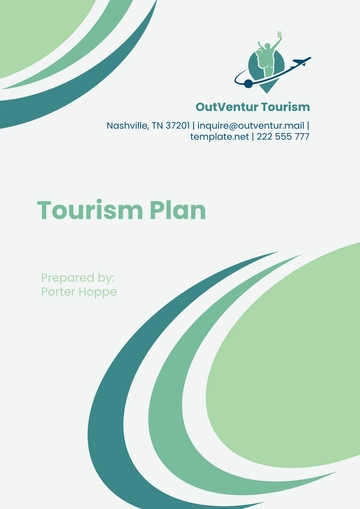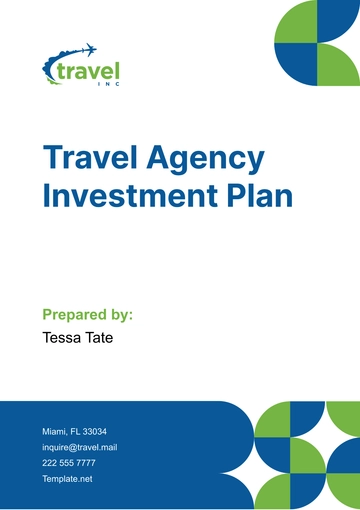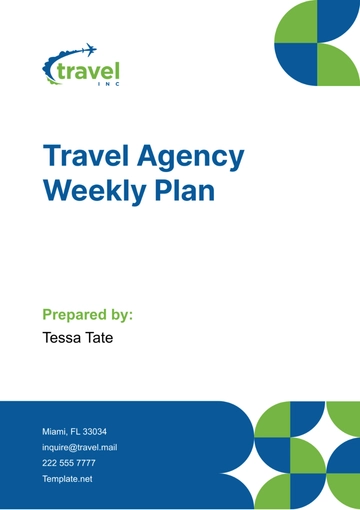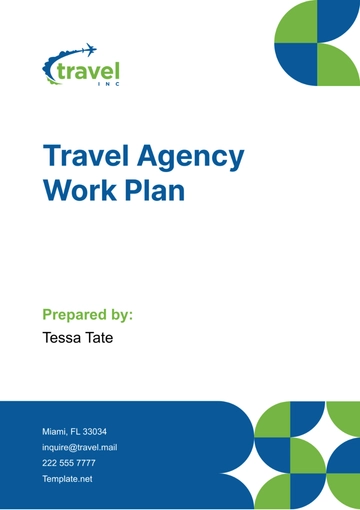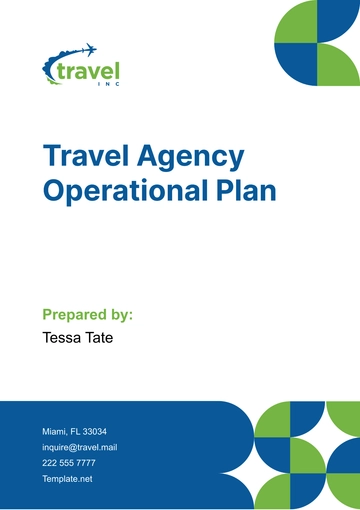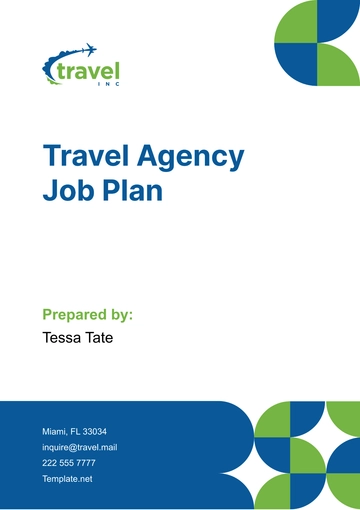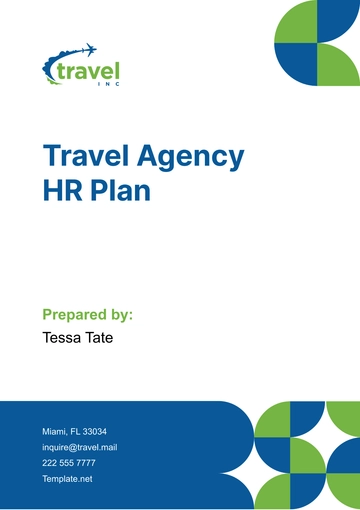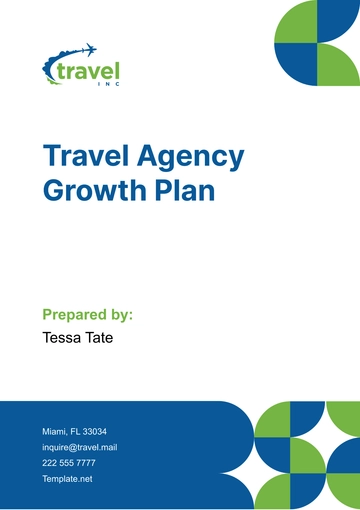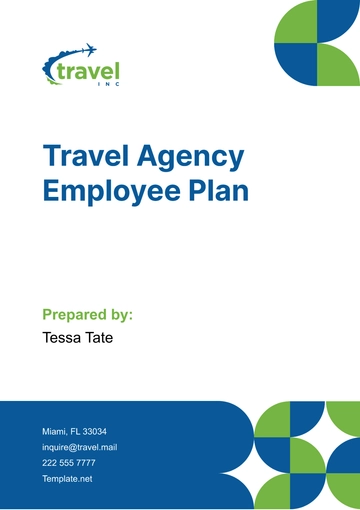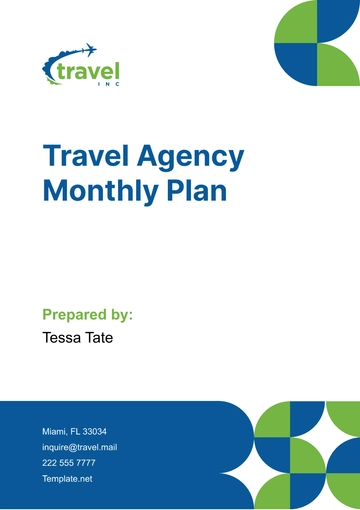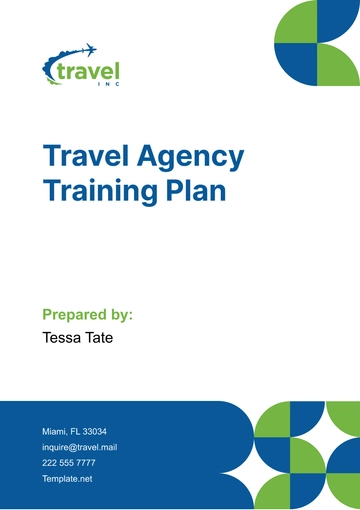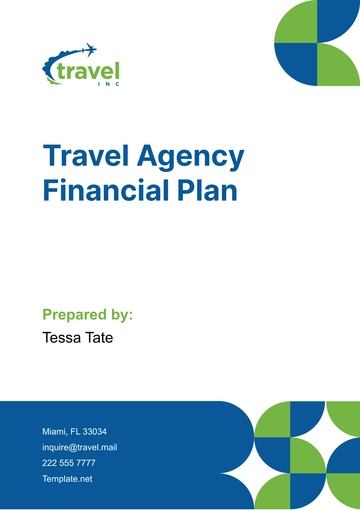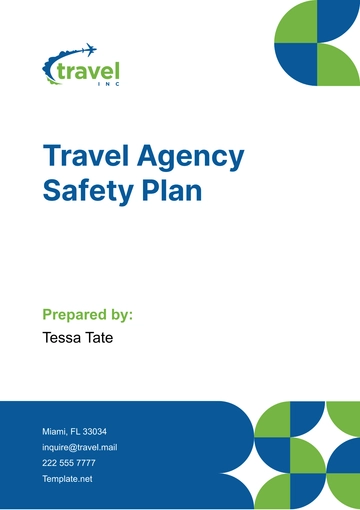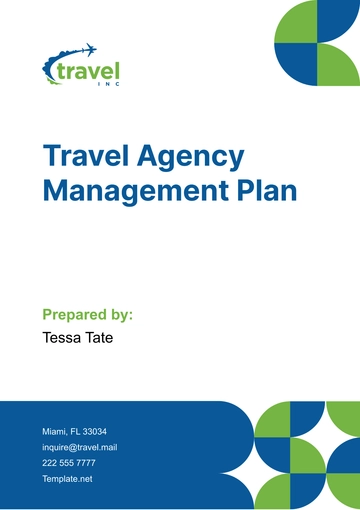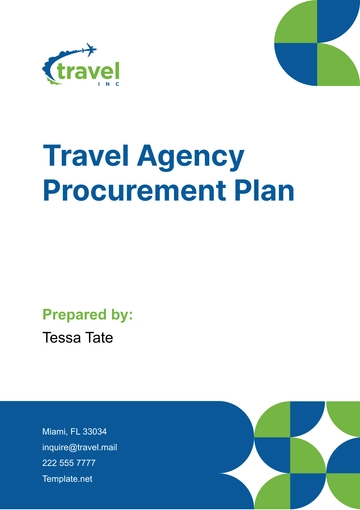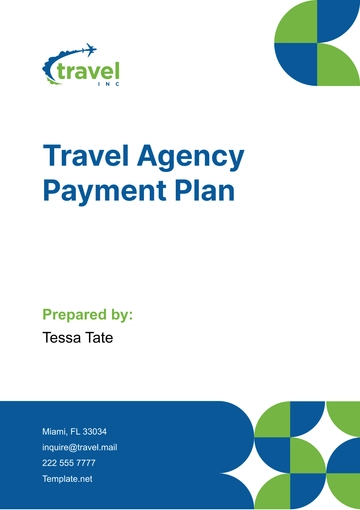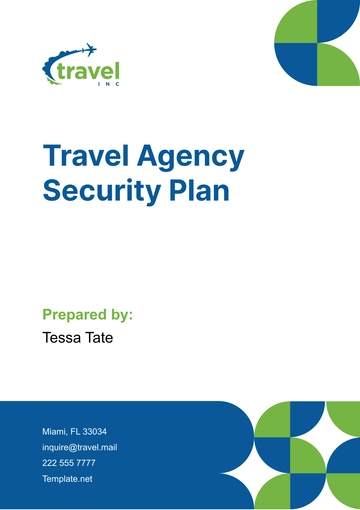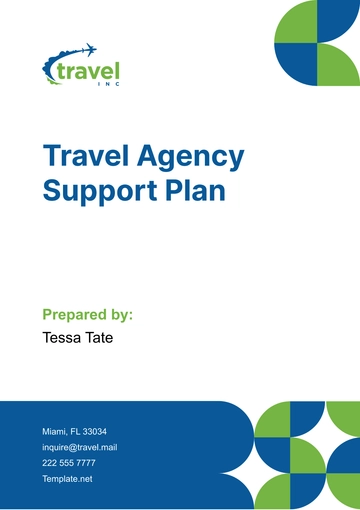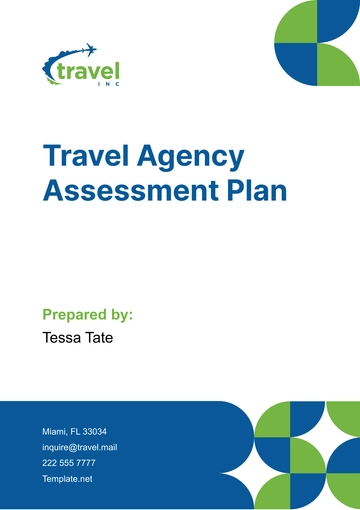Free Travel Agency Operational Plan
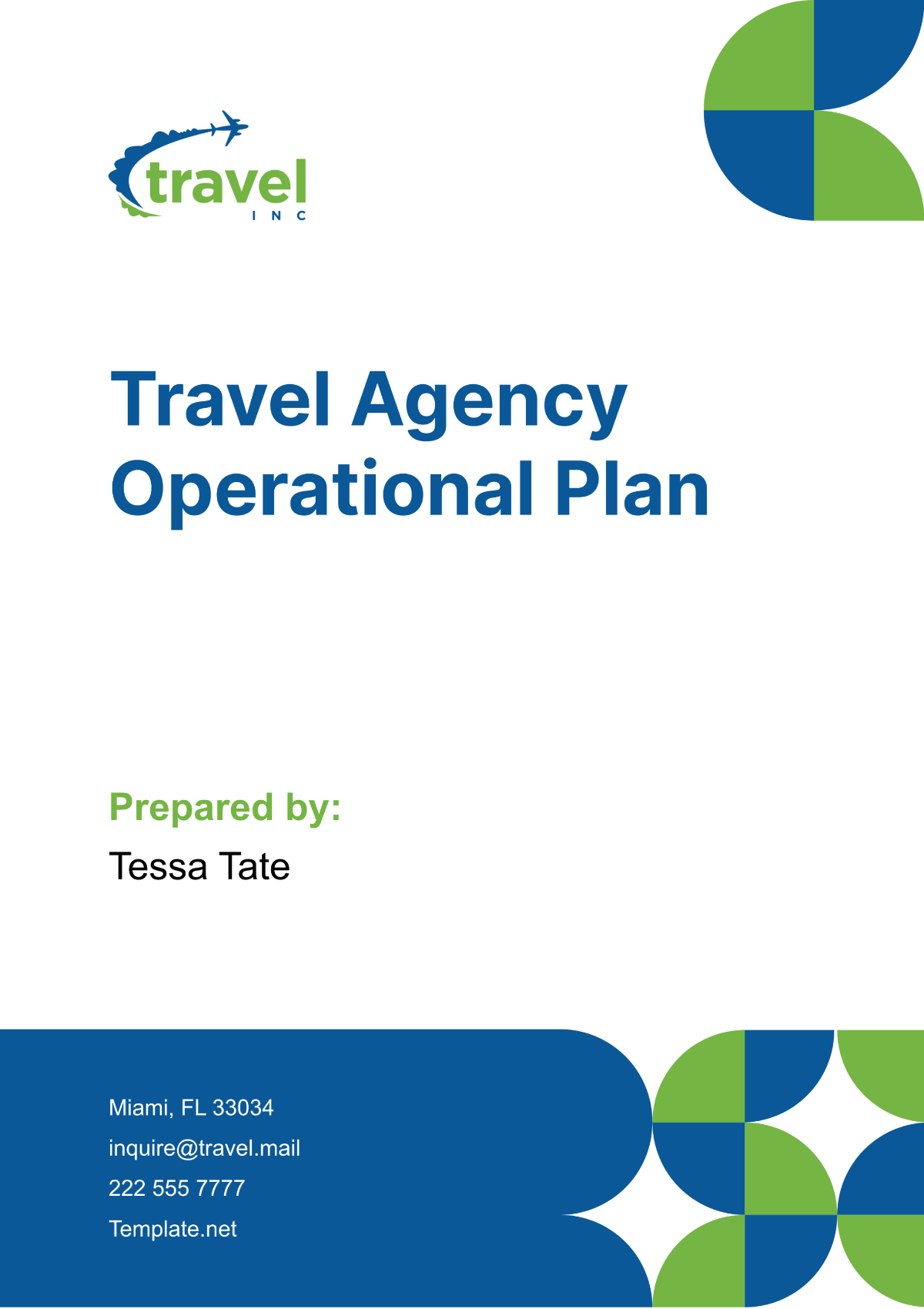
I. Executive Summary
In this Operational Plan, we outline the strategic actions and processes that are crucial for achieving optimal performance and realizing our agency's objectives. This plan serves as a blueprint for the efficient operation of our business, ensuring that all functions align with our overarching goal of delivering exceptional travel experiences to our clients. Key objectives of this plan include:
Enhancing service delivery to improve customer satisfaction
Streamlining operational processes to increase efficiency
Integrating advanced technology to support operations and marketing
Expanding market reach through strategic partnerships and innovative marketing
II. Organizational Structure
Our organizational structure is designed to support efficient operations and clear communication across all departments. Below is a table outlining the roles and responsibilities within our agency:
Role | Responsibilities |
|---|---|
CEO | Strategic oversight, company leadership |
Operations Manager | Overseeing daily operations, managing staff |
Marketing Manager | Developing marketing strategies, overseeing campaigns |
Sales Manager | Leading sales team, setting sales targets |
Customer Service Manager | Managing customer inquiries and complaints, maintaining customer satisfaction |
IT Manager | Managing IT infrastructure, data security, implementing new technology |
HR Manager | Recruitment, training, employee relations |
III. Operations Strategy
A. Core Business Activities
Our core business activities are fundamental to our mission of providing top-notch travel solutions. These activities include:
Travel Planning and Booking: Customizing travel itineraries based on client preferences and managing all booking aspects.
Customer Support: Offering ongoing support before, during, and after travel.
Marketing and Promotion: Implementing strategies to reach new customers and retain existing ones.
Partnership Management: Collaborating with hotels, airlines, and other service providers to offer comprehensive travel packages.
B. Standard Operating Procedures (SOP)
To ensure consistency and quality across our services, we have developed detailed Standard Operating Procedures (SOPs). These SOPs cover various aspects of our operations including:
Booking Process
Customer Complaint Handling
Staff Training
Emergency Response
By adhering to these SOPs, we ensure that all operational activities are conducted in a standardized and efficient manner, enhancing overall productivity and customer satisfaction.
IV. Service Delivery
A. Travel Services
Our agency provides comprehensive travel services designed to meet the diverse needs of our clients. From adventure travel to luxury retreats, our offerings are tailored to ensure an exceptional travel experience. Our methods for delivering these services include:
Personalized Travel Itineraries: Creating custom travel plans based on individual client preferences.
Group Tours: Organizing guided tours for groups, which include special events and exclusive experiences.
Corporate Travel Management: Offering full-service management of business travel for corporate clients.
Specialty Travel Packages: Designing travel packages that cater to specific interests such as culinary tours, wellness retreats, and cultural exploration.
B. Bookings
Efficient and accurate booking processes are essential for client satisfaction and operational success. We manage bookings through:
Online Booking System: Allowing clients to book travel arrangements directly through our website.
Phone Reservations: Providing personal assistance via telephone to help clients plan and book their travel.
Email: Confirming and adjusting bookings via email, providing a written record for both parties.
In-Person Appointments: Offering personal consultations at our offices for customized travel planning.
C. Customer Inquiries
Responding to customer inquiries promptly and effectively is a priority. We handle customer inquiries through:
24/7 Support Line: A dedicated phone line that offers around-the-clock assistance to address any travel concerns.
Email Support: Providing detailed responses to queries received via our customer service email.
Live Chat: A feature on our website that offers real-time assistance from travel experts.
FAQ Section on Website: A comprehensive resource where customers can find answers to common questions instantly.
D. Complaints
Handling complaints efficiently and with a customer-focused approach is crucial for maintaining satisfaction and trust. Our methods for managing complaints include:
Immediate Acknowledgment: Recognizing receipt of the complaint and providing a timeline for resolution.
Dedicated Complaints Team: Specialists trained to handle complex issues and ensure a satisfactory resolution.
Follow-up Calls: Personal calls to ensure that the resolution was satisfactory and to regain the trust of the customer.
Feedback Surveys: Post-resolution surveys that help us understand the customer's experience and identify areas for improvement.
V. Technology and Systems
In our commitment to delivering exceptional service and enhancing operational efficiency, we continuously evaluate and upgrade our technology and systems. Below is a table outlining our current technology, alongside planned upgrades:
Current Technology | Planned Upgrade |
|---|---|
Basic Booking System | Advanced Booking Engine |
Standard CRM System | Customized CRM Solutions |
Email Marketing Software | Integrated Marketing Automation Tool |
Manual Data Entry Systems | AI-Powered Data Management |
These upgrades are strategically chosen to enhance our service delivery capabilities, improve customer interactions, and optimize our marketing efforts. Implementing advanced technologies will allow us to better understand customer needs, personalize our services, and streamline internal operations, thus driving overall business growth and customer satisfaction.
VI. Marketing and Sales
Our marketing and sales strategies are designed to enhance brand visibility, attract new customers, and retain existing ones. These strategies include:
Digital Marketing: Utilizing SEO, PPC, and social media platforms to increase online presence and attract bookings from key target markets.
Content Marketing: Developing engaging content that highlights our travel packages and expertise, distributed through blogs, videos, and e-newsletters.
Partnership Marketing: Collaborating with airlines, hotels, and local tour operators to create exclusive travel deals that can be marketed jointly.
Customer Loyalty Programs: Implementing a loyalty program that rewards repeat customers with discounts, upgrades, and special offers.
Referral Programs: Encouraging satisfied customers to refer friends and family with incentives for both the referrer and the new customer.
Trade Shows and Events: Participating in trade shows and industry events to network with potential clients and promote our services.
VII. Financial Management
A. Budget
Effective budget management is essential for maintaining financial health and supporting strategic investments. We allocate our budget across various departments and projects to ensure optimal resource utilization and achievement of our financial goals. Below is a table providing a detailed breakdown of our annual budget:
Department/Project | Allocation (%) | Amount ($)* |
|---|---|---|
Technology Upgrades | 20% | 100,000 |
Marketing and Sales | 25% | 125,000 |
Operations | 30% | 150,000 |
Human Resources | 10% | 50,000 |
Contingency Fund | 15% | 75,000 |
B. Revenue Stream
Our agency generates revenue through several primary streams that support the sustainability of our business. Below is a table illustrating these revenue sources:
Revenue Source | Projected Annual Revenue ($)* |
|---|---|
Service Fees | 300,000 |
Commission from Partners | 150,000 |
Customized Travel Packages | 200,000 |
Online Booking | 100,000 |
C. Cost Control Measures
To maintain financial stability and profitability, we implement several cost control measures:
Regular Financial Audits: To ensure expenses align with budget allocations and to identify any financial discrepancies or areas of overspending.
Strategic Vendor Negotiations: To obtain the best possible prices and terms for services and products we require.
Efficiency Improvements: Continuous review of operational processes to find efficiency gains that can reduce costs.
Preventative Maintenance: Regular maintenance of technology and equipment to avoid costly emergency repairs.
VIII. Risk Management
Effective risk management is crucial for minimizing potential disruptions to our operations. Below is a table outlining key risks, their likelihood, and potential impacts:
Risk | Likelihood | Impact | Mitigation Strategy |
|---|---|---|---|
Data Security Breach | Medium | High | Implement robust cybersecurity measures and regular IT audits. |
Economic Downturn | Low | High | Diversify revenue streams and maintain a strong reserve fund. |
Supplier Failure | Medium | Medium | Establish multiple supplier relationships and contingency plans. |
Regulatory Compliance Issues | Low | High | Stay updated with industry regulations and conduct regular compliance training. |
IX. Monitoring and Evaluation
To assess the effectiveness of our operational plan, we monitor specific key performance indicators. Below is a table with these metrics and their target values:
Metric | Target Value |
|---|---|
Customer Satisfaction Index | 90% |
Operational Cost Savings | 5% |
Employee Turnover Rate | Less than 10% |
Revenue Growth Rate | 15% |
Evaluations occur quarterly and annually, involving comprehensive reviews of these metrics through internal audits and performance reports. Adjustments are made based on these evaluations to ensure continuous improvement and alignment with our strategic goals.
X. Conclusion
This Operational Plan sets a clear path forward for our agency, outlining the strategies, resources, and controls necessary to achieve our objectives. By meticulously planning and monitoring our operations, we ensure that we can adapt to changes, overcome challenges, and capitalize on opportunities to drive success and growth in the competitive travel industry.
- 100% Customizable, free editor
- Access 1 Million+ Templates, photo’s & graphics
- Download or share as a template
- Click and replace photos, graphics, text, backgrounds
- Resize, crop, AI write & more
- Access advanced editor
The Travel Agency Operational Plan Template from Template.net provides a structured approach to managing daily operations and long-term strategic actions. Editable and customizable in our AI Editor tool, this template helps you define operational procedures, allocate resources efficiently, and set performance metrics. It ensures that all aspects of your travel agency's operations are aligned with business goals, enhancing productivity and service quality.
You may also like
- Finance Plan
- Construction Plan
- Sales Plan
- Development Plan
- Career Plan
- Budget Plan
- HR Plan
- Education Plan
- Transition Plan
- Work Plan
- Training Plan
- Communication Plan
- Operation Plan
- Health And Safety Plan
- Strategy Plan
- Professional Development Plan
- Advertising Plan
- Risk Management Plan
- Restaurant Plan
- School Plan
- Nursing Home Patient Care Plan
- Nursing Care Plan
- Plan Event
- Startup Plan
- Social Media Plan
- Staffing Plan
- Annual Plan
- Content Plan
- Payment Plan
- Implementation Plan
- Hotel Plan
- Workout Plan
- Accounting Plan
- Campaign Plan
- Essay Plan
- 30 60 90 Day Plan
- Research Plan
- Recruitment Plan
- 90 Day Plan
- Quarterly Plan
- Emergency Plan
- 5 Year Plan
- Gym Plan
- Personal Plan
- IT and Software Plan
- Treatment Plan
- Real Estate Plan
- Law Firm Plan
- Healthcare Plan
- Improvement Plan
- Media Plan
- 5 Year Business Plan
- Learning Plan
- Marketing Campaign Plan
- Travel Agency Plan
- Cleaning Services Plan
- Interior Design Plan
- Performance Plan
- PR Plan
- Birth Plan
- Life Plan
- SEO Plan
- Disaster Recovery Plan
- Continuity Plan
- Launch Plan
- Legal Plan
- Behavior Plan
- Performance Improvement Plan
- Salon Plan
- Security Plan
- Security Management Plan
- Employee Development Plan
- Quality Plan
- Service Improvement Plan
- Growth Plan
- Incident Response Plan
- Basketball Plan
- Emergency Action Plan
- Product Launch Plan
- Spa Plan
- Employee Training Plan
- Data Analysis Plan
- Employee Action Plan
- Territory Plan
- Audit Plan
- Classroom Plan
- Activity Plan
- Parenting Plan
- Care Plan
- Project Execution Plan
- Exercise Plan
- Internship Plan
- Software Development Plan
- Continuous Improvement Plan
- Leave Plan
- 90 Day Sales Plan
- Advertising Agency Plan
- Employee Transition Plan
- Smart Action Plan
- Workplace Safety Plan
- Behavior Change Plan
- Contingency Plan
- Continuity of Operations Plan
- Health Plan
- Quality Control Plan
- Self Plan
- Sports Development Plan
- Change Management Plan
- Ecommerce Plan
- Personal Financial Plan
- Process Improvement Plan
- 30-60-90 Day Sales Plan
- Crisis Management Plan
- Engagement Plan
- Execution Plan
- Pandemic Plan
- Quality Assurance Plan
- Service Continuity Plan
- Agile Project Plan
- Fundraising Plan
- Job Transition Plan
- Asset Maintenance Plan
- Maintenance Plan
- Software Test Plan
- Staff Training and Development Plan
- 3 Year Plan
- Brand Activation Plan
- Release Plan
- Resource Plan
- Risk Mitigation Plan
- Teacher Plan
- 30 60 90 Day Plan for New Manager
- Food Safety Plan
- Food Truck Plan
- Hiring Plan
- Quality Management Plan
- Wellness Plan
- Behavior Intervention Plan
- Bonus Plan
- Investment Plan
- Maternity Leave Plan
- Pandemic Response Plan
- Succession Planning
- Coaching Plan
- Configuration Management Plan
- Remote Work Plan
- Self Care Plan
- Teaching Plan
- 100-Day Plan
- HACCP Plan
- Student Plan
- Sustainability Plan
- 30 60 90 Day Plan for Interview
- Access Plan
- Site Specific Safety Plan
